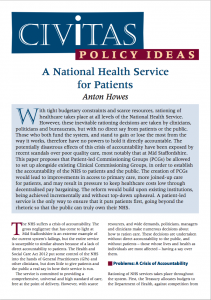
Shortly before the 1911 National Insurance Act – the Act which practically destroyed the friendly societies and inaugurated the welfare state – the magazine of the Oddfellows carried this:
Working men are awakening to the fact that this is a subtle attempt to take from the class to which they belong the administration of the great voluntary organisations which they have built up for themselves, and to hand over the future control to the paid servants of the governing class … This is not liberty; this is not development of self-government, but a new form of autocracy and tyranny not less but the more dangerous because it is benevolent in its intentions. (Oddfellows Magazine, September 1911, p. 544)
I joined Oddfellows immediately after reading this passage in David G Green’s Working Class Patients and the Medical Establishment: Self-help in Britain from the Mid-nineteenth Century to 1948. The book tells the story of how medical professionals once answered to the working people who were their patients and who paid for their services. It seems the profession did not like it terribly much but the arrangement succeeded for patients.
Some wonderful, talented people in the NHS work tremendously hard and some really first-rate clinical care is delivered but anyone in politics will know just how dissatisfied the public are with the decline of local hospitals, poor access to GPs and the absence of meaningful accountability to patients and taxpayers. One way to make progress would be to recapture the best of the old tradition of mutuality in the purchase of medical services.
In his paper for Civitas, A National Health Service for Patients, Anton Howes explains how the present crisis of accountability could be solved by the incremental introduction of “Patient-led Commissioning Groups”:
With tight budgetary constraints and scarce resources, rationing of healthcare takes place at all levels of the National Health Service. However, these inevitable rationing decisions are taken by clinicians, politicians and bureaucrats, but with no direct say from patients or the public. Those who both fund the system, and stand to gain or lose the most from the way it works, therefore have no powers to hold it directly accountable. The potentially disastrous effects of this crisis of accountability have been exposed by recent scandals over poor quality care, most notably that at Mid Staffordshire. This paper proposes that Patient-led Commissioning Groups (PCGs) be allowed to set up alongside existing Clinical Commissioning Groups, in order to establish the accountability of the NHS to patients and the public. The creation of PCGs would lead to improvements in access to primary care, more joined-up care for patients, and may result in pressure to keep healthcare costs low through decentralised pay bargaining. The reform would build upon existing institutions, being achieved incrementally and without top-down upheaval. A patient-led service is the only way to ensure that it puts patients first, going beyond the rhetoric so that the public can truly own their NHS.
My article on the idea for ConservativeHome is here. Anton’s paper, which I thoroughly recommend, is here.
The idea is bound to be opposed by those who do not wish to answer to patients but I hope eventually the cooperative mechanisms which once worked so well in our history will once again drive up standards and drive down costs in healthcare.
Such terrible confusion surrounds the (re)organisation of the NHS.
The NHS is a self serving government organisation whose principle role is to defend itself itself against political interferance. They have no other target and so what else might we expect.
Certainly some of the participants might be concerned about patient care but I bet in the main they are more interested in achieving politically set targets.
Three things are absent: proper competition, a need to generate a profit and a need to make a proper return on capital.
This and only this will reform the NHS to make it responsive to patients: a need to earn their keep by competing with others in order to attract patients.
No more soft options of receiving their monetary needs through taxation and no more need for the politicians to interfere.
The NHS has gone badly wrong and nobody is going to make it work through yet another re-organisation, no matter how smart they might be
A town of this size needs a fully functional A & E Department. Nor to mention its proximity to major transport routes.